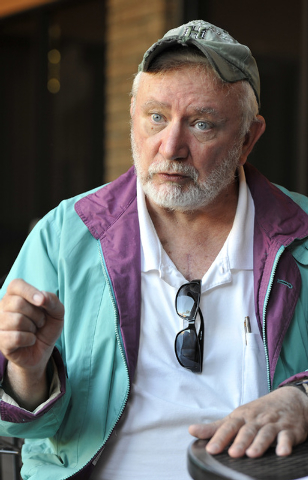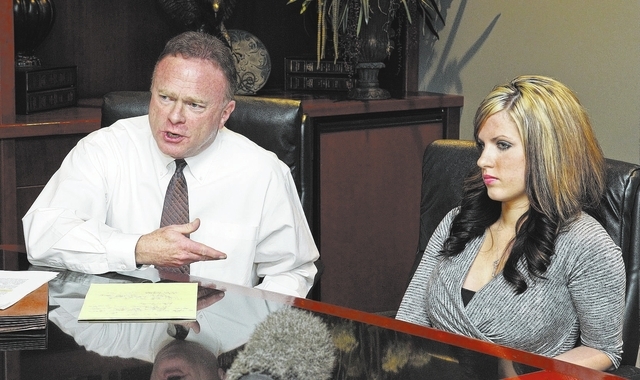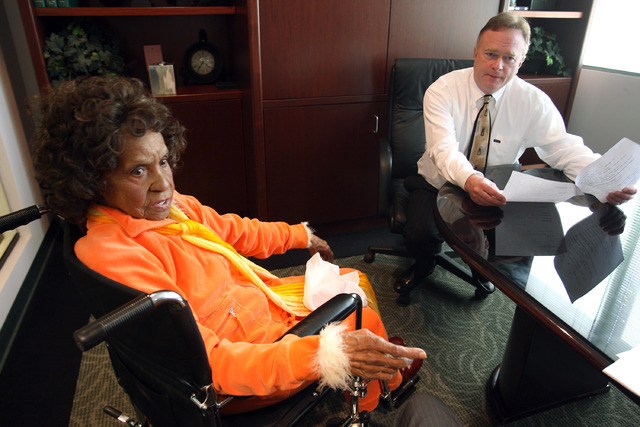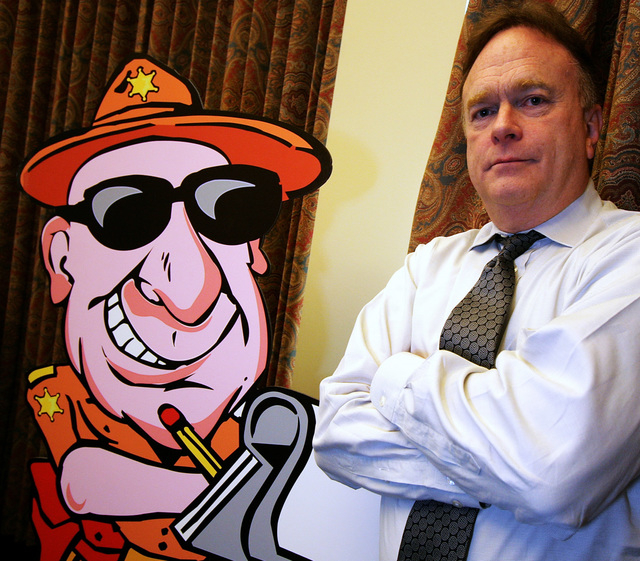Nevada may have to pay for health exchange errors












Consumers are getting restless.
And wherever there are unhappy consumers, lawsuits often follow.
Whether they are frightened of going without medical care, angry about not receiving their insurance cards or trying to prove a point, Nevadans increasingly say they are weighing legal action over the rollout of Nevada Health Link, the state exchange through which they can buy coverage to comply with the federal Affordable Care Act.
The exchange’s glitch-riddled website has prevented thousands from enrolling in plans.
Other consumers who have made it through the system say they have paid premiums but received no verification of a plan, and can’t see their doctor as a result.
Courts nationwide already are clogged with Obamacare-related lawsuits ranging from whether tax credits apply to consumers who bought on the federal exchange to whether the law’s employer mandate is constitutional.
A growing number of legal challenges relate to how the law is affecting consumers.
A California legislator is suing the Covered California exchange because he said the agency has forced cancellation of more than a million existing policies.
Also in California, two consumers have sued for being persuaded to switch to new coverage when they didn’t have to. New York’s attorney general is investigating on behalf of patients who enrolled through the state’s exchange but have been left without coverage.
The wave of lawsuits hasn’t washed over Nevada yet, but it’s a matter of time.
“A class action suit is just waiting to happen. I definitely see it happening,” said Pat Casale, a Las Vegas insurance broker with Pat Casale &Associates.
“Eventually, people’s claims will be paid, but eventually isn’t good enough,” said Casale, who has had clients go without care after coverage mix-ups in plans bought on the exchange. “Pretty soon, phone calls are going to be coming in from providers for payment, and the pressure is going to be on.”
PROBLEMs add up
Richard Harris, managing partner of the Richard Harris Law Firm in Las Vegas, said his firm has received calls from disgruntled patients. Harris said he knows of no lawsuit filed in Nevada, though that could change if the exchange doesn’t improve soon.
“The question is whether you’re wrongfully denying people coverage which they’re entitled to. You could make a case for tort liability in the abstract, yes. There’s technically tort liability for the state,” Harris said.
How liable the state might be is the question. First, some background on the issues exchange users face.
Start with the smaller cases.
Lori Friel-Frame has reached out to the Review-Journal several times to share her woes. Friel-Frame most recently wrote to say she was “going to have to contact an attorney for some action.”
Here’s why: Friel-Frame signed up for coverage through Nevada Health Link on Dec. 17. She said the exchange mistakenly deducted her $945.72 premium twice. What’s more, she never received any plan information, and discovered any coverage she did have excluded her doctor from its network, even though the provider was listed on the exchange website.
So, Friel-Frame canceled the policy and demanded the return of her $1,891.44. Her emails to the exchange went without a response, although she has received bills from the system asking for her February and March premiums. She filed an insurance-fraud complaint March 3 with Nevada Attorney General Catherine Cortez Masto and is looking at additional legal action.
“A class action suit is something I will discuss with an attorney when I hire one,” she said.
A spokeswoman for the attorney general’s office said the agency has received three complaints related to exchange coverage, but she said the office could not discuss the cases in any detail.
Other consumers have bigger problems.
Some have delayed care for serious health threats because they are unable to verify coverage or plan networks.
A local oncology practice had to turn away new patients with exchange coverage during the four months it took to iron out its provider contract.
At least one patient with a chronic lung disease had to cancel several doctors’ appointments and go without some prescriptions when the exchange couldn’t find her in its system, though it had cashed her premium check.
Another patient has run up nearly $500,000 in heart-surgery bills that no one is covering, even though he’s been paying premiums to the exchange since November.
Chris Carothers, president of Carothers Insurance Agency in Las Vegas, said he has at least one client who has asked about suing.
“He’s mad because he’s paying for something he can’t use. He has no evidence of insurance, and he’s just so frustrated that he has no idea what else to do but sue. People are threatening to sue because they can’t get anyone’s attention,” Carothers said.
NEVADA’S LIABILITY
Figuring what Nevada might be on the hook for starts with understanding what kind of action a consumer could take.
Harris said any potential exchange-related cases involve torts, or civil wrongs that don’t involve a breach of contract.
In torts, Nevada has a degree of legal immunity. You can sue the state, but you can’t collect more than $100,000, no matter how much you have been wronged.
Bill Maupin, a former chief justice of the Nevada Supreme Court and a shareholder in Lionel Sawyer &Collins’ litigation department, said that is why he is not too concerned about big costs passed on to the public.
“I don’t see any significant exposure to the state except on an episodic basis,” he said. “The cap gives us protection.”
But Xerox, the vendor that won the $72 million contract to build Nevada Health Link’s website, may not enjoy the same protection. The state liability cap likely does not extend to the private contractor, said Lynn Fulstone, a shareholder in Lionel Sawyer &Collins’ business law department.
Nor is it likely that Xerox could raise its fees to cover potential judgments against it, although “how all of this works from the standpoint of the consumer has yet to be seen,” Maupin said.
Still, $100,000 per consumer could add up if enough people sue and win.
The jury is out on whether many people will succeed in court.
Proving damages in most cases will be tough, Harris said.
The issue is whether inability to use insurance you’ve paid for caused injury or death. The mix-up involving the oncology practice and the exchange’s network lists raised Harris’ eyebrows; but in general, consumers will have to demonstrate they suffered bodily harm.
That’s a big hurdle because uninsured consumers do have options for care, including going to University Medical Center or contacting Clark County Social Services for help with bills, Harris said.
“It seems to me it would be very difficult to prove that this sequence of events caused someone to be killed or seriously injured,” Harris said. “The threshold question is, ‘What harm did it cause besides anxiety?’ ”
Even if cases are unprovable or damages sought are small, any jump in lawsuits related to Obamacare could add to logjams in state and local courts. That’s why local attorneys have a few words of advice for both the exchange and for consumers on how to avoid legal trouble.
For starters, the exchange and Xerox need to be more responsive to consumers.
Xerox built a pile of more than 30,000 unanswered letters and emails through February, though the vendor said it has been working hard to slash that correspondence. Letting things get that out of hand in the first place is never a good idea if you want to avoid legal troubles.
“In any profession, it goes so far to be considerate, to listen, to get back to people and to try to fix a problem,” Fulstone said. “Even if you don’t have anything to tell them, get back to them.”
And consumers should think twice before they waste their — and the system’s — time and money filing a lawsuit, Fulstone said.
“The last thing a patient wants to do is call an attorney. That’s not going to solve the patient’s problems. Assuming there’s no health problem, the amount attributable to damages will not be sufficient for them to go hire an attorney. The patient needs to protect himself or herself; and the way to do that is to make sure you’ve got the proper documentation, that you are enrolled and that you paid your premium. It’s not different from the old days: Keep copies of your application and check.”
Contact reporter Jennifer Robison at jrobison@reviewjournal.com. Follow @J_Robison1 on Twitter.


















